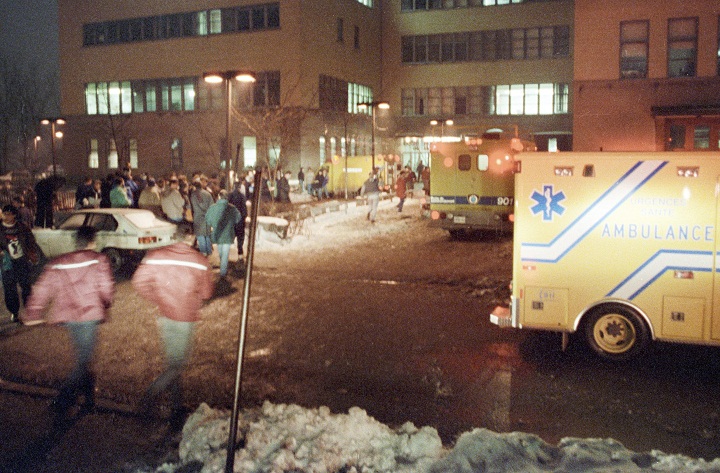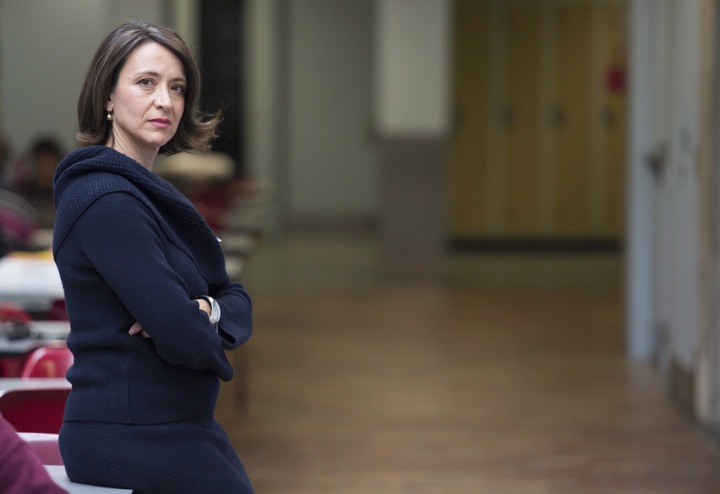WATCH ABOVE: For the victims of the École Polytechnique shootings, the emotional wounds of that day are still raw. As Paola Samuel reports, one woman who survived the shooting is working to turn an attack against women into a positive support system for them.

I saw a tweet from a Quebec news network asking “Should we still commemorate the massacre at Polytechnique 25 years later?”
There is so much wrong with that question, I can’t write fast enough.
Should we still commemorate the worst mass murder in Canadian history?
Should we still pay tribute to those 14 young women, full of potential shot down in the prime of their lives?
Should we still talk about the fact that they were killed just for being women?
I think Canada’s justice minister answered that question very clearly this week.
But I digress. I don’t want this to be viewed simply as political, because it’s not.
It is in fact very, very personal for me, for many of us.
I was those 14 young women.
I was a 23-year-old second-year journalism student in Montreal when Marc Lépine decided that young girls who had chosen to study engineering ruined his life.
WATCH: People attending a ceremony commemorating the 25th anniversary of the École Polytechnique shootings stood for a moment of silence to pay tribute to the victims.
On December 6, 1989, we were finishing exams, and just like those young girls, we were planning our Christmas holidays.
We headed out of class, about two dozen of us maybe, to go grab a celebratory beer at the Pine Pub.
A light snow was falling as we made our way over, we were in a great mood.
We lived in the best city in the world, we were surrounded by friends, male and female, we were full of potential, convinced that, although our parents seemed to be screwing things up quite badly, we would be the generation that changed the world.
When we walked into the pub, the TV sets were on, some sports event of some sort.
We were laughing, collaborating, drinking, discussing, debating, for about half an hour, and then someone changed the channel.
There was a murmur about a shooting at a university.
We thought it was a bad joke, maybe someone called it in to police to get out of exams.
We knew nothing of school shootings or mass murder.
Certainly the idea that a man would walk into a university and open fire on women was the furthest thing from our minds.
But then it started to become clear that that’s exactly what was happening at the prestigious school just a few blocks from where we were sitting.
Everything stopped in that moment.
We watched in horror as the story played out on the screens in front of us. We didn’t stay long at the pub.
In photos: A glimpse back to that tragic evening on December 6, 1989
I remember staring wide-eyed at the TV sets, holding hands with the classmate beside me (hers were shaking), reaching out to hug another of my journalism friends (he had tears in his eyes).
Our party was over. Our image of our city as a safe, enlightened, forward-thinking, urban paradise was shattered.
The walk home was painful, every step a flog through the ice and snow, my eyes blurred by the tears stinging their edges, waiting to be let go.
The next day, the Montreal Gazette’s front page featured a now infamous picture of one of the victims, slumped in a chair in the cafeteria at École Polytechnique.
A police officer had climbed a chair behind her to pull down the big “Joyeux Noel” sign that was draped across the room.
She was not identified in the newspaper, but I found out later that day that she was Anne-Marie Edward, a 21-year-old chemical engineering student, and cherished little sister of my journalism classmate Jimmy Edward.
WATCH: Jim Edward shares his memories of his sister 25 years later
For weeks, right up until Christmas, the stories kept coming.
The first victim identified was Maryse Leclair, 23 years old.
Her body was found inside the school by her father, Montreal police lieutenant Pierre Leclair.
Annie Turcotte, the youngest victim at 20 years old, loved diving and went into engineering because she wanted to improve the environment.
Annie St. Arnaud, was finishing up her degree and had a job interview scheduled for December 7.
Michèle Richard and Maud Haviernick were presenting a paper together in front of the class when they were shot.
They were me.
Sonia Pelletier had five brothers and sisters and was the pride of her small Gaspe town, Anne-Marie Lemay loved singing, Maryse Laganière had recently been married, Barbara Klucznik-Widajewicz was a recent immigrant from Poland, Barbara Daigneault followed in her father’s footsteps to study engineering, Nathalie Croteau and Helen Colgan were classmates planning a two-week vacation together in Mexico for their Christmas break, and Geneviève Bergeron was a graduate of downtown’s FACE school who loved the arts.
- What is a halal mortgage? How interest-free home financing works in Canada
- Ontario doctors offer solutions to help address shortage of family physicians
- Capital gains changes are ‘really fair,’ Freeland says, as doctors cry foul
- Budget 2024 failed to spark ‘political reboot’ for Liberals, polling suggests
They were all me.
They had all died because one man decided he didn’t like the idea of women studying in a field that had, up until then, been reserved for men.
Read more: Remembering the women who died at École Polytechnique
If Marc Lépine had wanted to be a journalist instead of an engineer.
If he had been rejected from studying in the traditionally male dominated field that opened it’s doors to me, my family may have been ripped apart by suffering, my brother may have spent the past 25 years lobbying for gun control and male enlightenment, my sons would never have been born.
Those girls were me.
And you.
And every other woman or man who does not see barriers in this world but sees opportunities.
Marc Lépine attacked women, he attacked engineers, he attacked an institution, but most of all he attacked an idea.
The idea that we are all equal, that we should all have the same opportunities, that no door should be closed to any one of us based on gender or race or religion.
Lépine, it seems, felt left out of the process, left behind by a society moving ahead at a pace that he just could not keep up with.
It made him angry. And he lashed out in the worst way possible.
Nathalie Provost was shot four times by Marc Lépine on that cold December evening 25 years ago. She survived.
Read more: Nathalie Provost, who was shot at Polytechnique, recalls tragic day
Twenty-five years later she is an engineer and a mother of four, and she told me this week that she doesn’t think we have come very far as a society since then.
She regrets the intense focus we put on winning above all else, on speed at the expense of understanding, on how we simply never stop and take a moment to reach out to others and check in to make sure that they are okay, that they are keeping up.
Nathalie Provost, one of the few people to survive after staring Marc Lépine in the eye, says chillingly, yes, this could happen again.
And this is why we need to keep remembering, and commemorating, because we still have a long way to go.
Remembering December 6: Share your memories





Comments